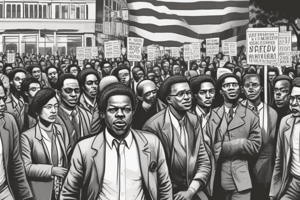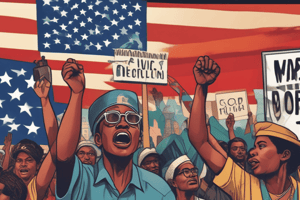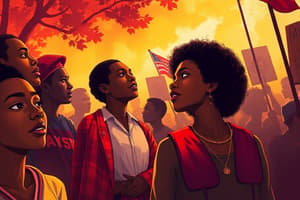Podcast
Questions and Answers
What was the primary strategy employed by the Civil Rights Movement?
What was the primary strategy employed by the Civil Rights Movement?
- Violent protests
- Lobbying and petitioning
- Nonviolent resistance (correct)
- Boycotts and strikes
Who popularized the concept of nonviolent resistance, which was later adopted by Martin Luther King, Jr.?
Who popularized the concept of nonviolent resistance, which was later adopted by Martin Luther King, Jr.?
- Bayard Rustin
- Mahatma Gandhi (correct)
- Malcolm X
- Rosa Parks
What was the main goal of the March on Washington for Jobs and Freedom in 1963?
What was the main goal of the March on Washington for Jobs and Freedom in 1963?
- To elect more African American representatives to Congress
- To boycott businesses that practiced discrimination
- To demonstrate the urgent need for substantial civil rights legislation (correct)
- To end racial segregation in schools
Where did Martin Luther King, Jr. deliver his iconic 'I Have a Dream' speech?
Where did Martin Luther King, Jr. deliver his iconic 'I Have a Dream' speech?
Who organized the March on Washington for Jobs and Freedom in 1963?
Who organized the March on Washington for Jobs and Freedom in 1963?
What was the primary purpose of the Voting Rights Act of 1965?
What was the primary purpose of the Voting Rights Act of 1965?
Who was the prominent leader in the Civil Rights Movement known for his philosophy of nonviolence and his 'I Have a Dream' speech?
Who was the prominent leader in the Civil Rights Movement known for his philosophy of nonviolence and his 'I Have a Dream' speech?
What was the outcome of the efforts of African American leaders and many others in the Civil Rights Movement?
What was the outcome of the efforts of African American leaders and many others in the Civil Rights Movement?
Who was the influential figure in the labor movement who proposed a mass march on Washington in 1963 to demand jobs for African Americans?
Who was the influential figure in the labor movement who proposed a mass march on Washington in 1963 to demand jobs for African Americans?
What was the primary approach advocated by Martin Luther King, Jr. in the Civil Rights Movement?
What was the primary approach advocated by Martin Luther King, Jr. in the Civil Rights Movement?
Flashcards are hidden until you start studying
Study Notes
The Civil Rights Movement, a pivotal period in American history, was marked by nonviolent resistance, marching, and significant legislative achievements that sought to end racial segregation and discrimination. This era was characterized by the determined struggle of African American leaders, who employed a range of methods to bring about change.
Nonviolent Resistance
Nonviolent resistance, a central strategy employed by the Civil Rights Movement, was based on the principles of passive resistance and civil disobedience. The concept of nonviolent resistance was popularized by Mahatma Gandhi and later adopted by Martin Luther King, Jr., who led nonviolent protest marches in Montgomery, Alabama, as part of the Montgomery Bus Boycott in 1955. King's philosophy of nonviolence was rooted in the belief that nonviolent methods could bring about lasting change and inspire a sense of social justice in society.
March on Washington
The March on Washington for Jobs and Freedom on August 28, 1963, was a pivotal moment in the Civil Rights Movement. Organized by veteran strategist Bayard Rustin, this march aimed to demonstrate the urgent need for substantial civil rights legislation. The march ended at the Lincoln Memorial, where Martin Luther King, Jr. delivered his iconic "I Have a Dream" speech, which became a symbol of the movement's hopes and aspirations for a more equal society.
Voting Rights Act
The Voting Rights Act of 1965 was a landmark piece of legislation that prohibited racial discrimination in voting. The Act was a response to the widespread disenfranchisement of African Americans, who were systematically denied their right to vote through poll taxes, literacy tests, and other forms of voter suppression. The Act not only outlawed such practices but also provided federal oversight of elections in states with a history of racial discrimination, effectively removing the barriers that prevented African Americans from exercising their right to vote.
African American Leaders
Several African American leaders played crucial roles in the Civil Rights Movement, advocating for nonviolent resistance and pushing for legislative change. Some of these leaders include:
- A. Philip Randolph: As the founder of the Brotherhood of Sleeping Car Porters, Randolph was an influential figure in the labor movement. He proposed a mass march on Washington in 1963 to demand jobs for African Americans and became a key organizer of the March on Washington.
- Bayard Rustin: A longtime activist, Rustin was instrumental in organizing the March on Washington and played a significant role in the Civil Rights Movement.
- Martin Luther King, Jr.: King was a prominent leader in the Civil Rights Movement and is widely recognized for his philosophy of nonviolence and his "I Have a Dream" speech.
- Malcolm X: Although he disagreed with King's nonviolent approach, Malcolm X was a powerful voice in the movement, advocating for black nationalism and self-determination.
These leaders and many others worked together to bring about change through nonviolent resistance, marching, and legislative achievements. Their efforts culminated in the passage of the Civil Rights Act of 1964 and the Voting Rights Act of 1965, which significantly altered the landscape of American society by outlawing discrimination based on race, color, religion, sex, or national origin.
Studying That Suits You
Use AI to generate personalized quizzes and flashcards to suit your learning preferences.




